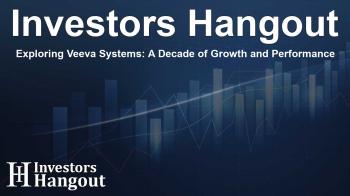Exploring Veeva Systems: A Decade of Growth and Performance

Veeva Systems: A Decade of Triumph
Veeva Systems (NYSE: VEEV) has displayed remarkable growth over the past ten years, consistently outperforming the market averages by an impressive 15.47% annually. Investors have generally enjoyed a substantial average annual return of 28.63%, a testament to the company’s robust business model and strategic foresight.
Market Capitalization and Performance
As of now, Veeva Systems holds a market capitalization of approximately $47.58 billion. This significant figure underscores the company’s stature within the healthcare industry, particularly in providing cloud-based solutions tailored for the global life sciences sector.
Investment Growth: A Hypothetical Scenario
For those considering an investment a decade ago, the numbers are striking. If an investor had put $1,000 into VEEV stock ten years ago, today, that investment would have surged to around $12,399.40. This substantial increase illustrates the potential of investing in high-growth tech companies, particularly in a necessary sector like healthcare.
The Impact of Compounded Returns
Understanding this growth leads to a key insight about compounded returns, a critical concept for investors looking to maximize their wealth over time. Compounded growth can transform even modest investments into significant returns, making long-term investments particularly tantalizing.
Conclusion: Why Veeva Systems Stands Out
Veeva Systems not only provides excellent investment opportunities but also exemplifies innovation in the life sciences landscape. With their commitment to research and development, they continue to pave the way for advanced solutions that cater to the evolving needs of the healthcare community. As Veeva Systems continues to thrive, both investors and stakeholders are well-poised to benefit from its distinguished trajectory.
Frequently Asked Questions
What is Veeva Systems?
Veeva Systems is a cloud-computing company specializing in solutions for the life sciences sector, aiming to enhance the development and commercialization of healthcare products.
How has Veeva performed over the last decade?
Over the past ten years, Veeva Systems has outperformed the market by 15.47% annually, achieving an average annual return of 28.63% for investors.
What would a $1000 investment yield today in VEEV?
If an investor purchased $1,000 worth of VEEV stock ten years ago, it would now be worth approximately $12,399.40 based on current stock prices.
What does market capitalization indicate?
Market capitalization is a critical indicator of a company’s size and market value, calculated by multiplying the stock price by the total number of outstanding shares.
Why is compounded growth important in investing?
Compounded growth reflects how investments can generate earnings, which then earn additional returns, significantly boosting overall wealth over time. It emphasizes the importance of long-term investing strategies.
About The Author
Contact Lucas Young privately here. Or send an email with ATTN: Lucas Young as the subject to contact@investorshangout.com.
About Investors Hangout
Investors Hangout is a leading online stock forum for financial discussion and learning, offering a wide range of free tools and resources. It draws in traders of all levels, who exchange market knowledge, investigate trading tactics, and keep an eye on industry developments in real time. Featuring financial articles, stock message boards, quotes, charts, company profiles, and live news updates. Through cooperative learning and a wealth of informational resources, it helps users from novices creating their first portfolios to experts honing their techniques. Join Investors Hangout today: https://investorshangout.com/
The content of this article is based on factual, publicly available information and does not represent legal, financial, or investment advice. Investors Hangout does not offer financial advice, and the author is not a licensed financial advisor. Consult a qualified advisor before making any financial or investment decisions based on this article. This article should not be considered advice to purchase, sell, or hold any securities or other investments. If any of the material provided here is inaccurate, please contact us for corrections.

